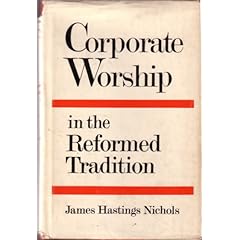From James Hastings Nichols, Corporate Worship in the Reformed Tradition, pp. 38-40
As the staple of private and family as well as of the services of the church, the psalms became known to many by heart. No other book of the Old Testament, at least, could rival the psalms in the affections and knowledge of the Reformed laymen. Ministers frequently preached from the Psalms also; the psalter was the only Old Testament book on which Calvin preached on Sundays. For every occasion, it seems, an appropriate verse would leap to the tongue of a Huguenot. And all over France, wherever Huguenots of the first generation were confined, often sometimes by the score, guards and jailers became familiar with the psalms, even to prisons on Santo Domingo and Martinique. The colporteurs who carried the psalters, with Bibles and catechisms, all over France, were frequently caught and burned. Many martyrs died with the words of the Apostles’ Creed, but it is surprising to see what a range of the psalter was drawn on by others.
The courage and joy of these martyrs who, like the ancient Christians, could have had release for a word, won converts among the onlookers. The authorities tried gags, but the cord would burn and from out of the smoke the psalm would again begin. The bishops then ordered that the tongues of the Huguenots should be cut out before they were burned. This became the general practice. At Orange, peices were torn from the Bible and psalters and forced into the mouths and wounds of the victims. “Eat your fill; tell your God to come rescue you.”
When the fifty-seven Protestants of Meaux were led off to the dungeon they lamented (to use a modern English version [I’m using the ESV–MH]):
O God, the nations have come into your inheritance;
they have defiled your holy temple;
they have laid Jerusalem in ruins.
They have given the bodies of your servants
to the birds of the heavens for food,
the flesh of your faithful to the beasts of the earth.
The fourteen of them who were later led out to execution sang on from the same psalm until their tongues were cut out:
Why should the nations say,
“Where is their God?”
Let the avenging of the outpoured blood of your servants
be known among the nations before our eyes!
Let the groans of the prisoners come before you;
according to your great power, preserve those doomed to die!
When Armed resistance began, Psalm 68 became the “Huguenot Marseillaise”[vv 1-2]:
God shall arise, his enemies shall be scattered;
and those who hate him shall flee before him!
As smoke is driven away, so you shall drive them away;
as wax melts before fire,
so the wicked shall perish before God!
At the battle of Coutras, the Reformed soldiers knelt and prayed and sang. Roman Catholic courtiers, observing, cried out that they were afraid and were confessing, but a more experienced officer said it was not so. They were singing [Psalm 118.24-25]:
This is the day that the Lord has made;
let us rejoice and be glad in it.
Save us, we pray, O Lord!
O Lord, we pray, give us success!
To know and love the psalms was the mark of the Protestant. The use of the psalter became a significant issue in the long nibbling away of the assurances of the Edict of Nantes. In 1623 singing of psalms was forbidden in the streets and shops. In 1657 it was prohibited at executions; in 1658, anywhere outside “temples,” as Protestant places of worship must be called. In 1659 psalms could not even be sung privately if audible outside, and in 1661 the singing of psalms anywhere in French territory became a felony.
